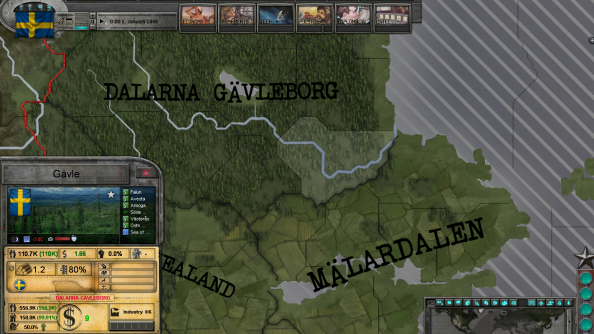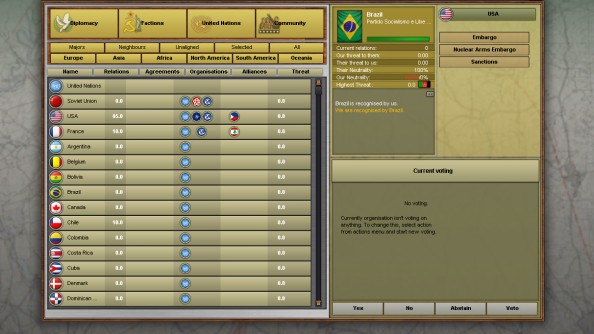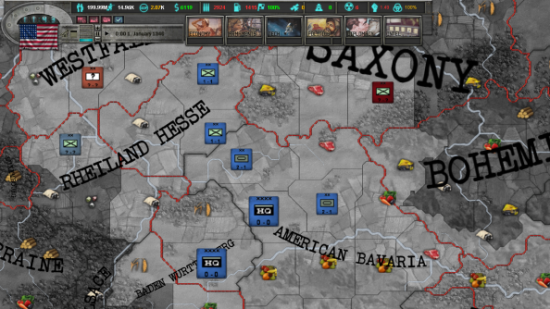The Hearts of Iron trilogy is well known amongst fans of historical grand strategy. It’s renowned for a depth and complexity that can both absorb and terrify. But while the series has previously focused on the Second World War, Hearts of Iron: East vs. West will be set in the middle of the 20th Century, with an eye firmly on the Cold War.
We’ve had a chance to chat to Hearts of Iron: East vs West’s game designer Gellert Keresztes about this vast project; and what’s possible. He says funny things about nuclear warfare.
For
this Hearts of Iron game, Paradox Development Studios are expanding the
scope in every direction. The game engine is set for a substantial
overhaul: you can expect East vs. West to have a smarter AI, be
mod-friendly and boast the same kind of 3D presentation as Crusader
Kings II and the forthcoming Europa Universalis IV.
The developers are also making substantial changes to the inner
workings of this one, meaning it won’t just be Hearts of Iron IV. “East
vs. West is a standalone grand strategy game, so players can expect a
brand new experience,” says Keresztes. “We’ve changed too many things to
stick with the Hearts of Iron III interface. It will certainly look
familiar to fans of that game, but it is an entirely new experience, we
hope.”
The
game starts in 1946 and ends in 1991. That time-period opens up new
possibilities for Paradox. The Cold War would be nothing without nukes,
and an atomic arms race forms the center of East vs West. Should the
worst come to the worst, it’s your decision when to launch the missiles
and drop the bombs. “For game purposes, we decided to let the players
have control of THE BUTTON,” says Keresztes, who hints that it might be
possible for one side to, at least technically, win a nuclear war.
Technology
doesn’t end with nukes: you’ll also want to invest in traditional
armies and space programs. Before you put all your money into spy
satellites, Keresztes warns that “Tech, of course isn’t everything.” He
illustrates his point with a historical example: “The Soviets are
researching tons of tank tech. Well good luck to them fighting me in the
mountains of Afghanistan!” Wait, they weren’t headed that way? “Crap
sir… there goes Europe. OMFG!”
If
you can’t afford to research it it yourself, you can ask your allies to
lend their support. To quote Mark Twain,” Keresztes explains. “The
principle of give and take is the principle of diplomacy: give one and
take ten. If you have the right friends, you are never really that far
behind.”
In
the rapidly changing world that was the 20th Century, with borders
being re-drawn as if by an excited kid with an Etch A Sketch, you don’t
have to take control of (or even take sides with) the major powers. As
with many of Paradox’s other grand strategy games, there’s the
opportunity to build a smaller country’s influence and prestige, perhaps
turning them into a major player on the world stage. Even neutral
Switzerland could change the course of history.
“One
of our main goals is to ensure that all our players have fun regardless
of which nation they are playing,” says Keresztes. “You might imagine
that neutral nations are passive and boring, especially in times of
conflict and turmoil. In fact, history has proved that it’s never an
easy task to balance two superpowers against one another and still
remain truly neutral, because at the same time as you make no enemies
you also usually run the risk of ending up without any real friends.”
Ask
not what your country can do for you, but where your country is
located, what it can offer its allies and how long it can hold out
against a superior force. It’s certainly true that many of the most
historically significant nations of the 20th Century weren’t the
largest, such as the aforementioned Afghanistan, Cuba and, of course,
Vietnam. Paradox want proxy conflicts to be significant and many
“smaller” wars to have much larger political consequences, much as they
did at the time.
There’ll
be an increased focus on espionage and negotiation as a way to achieve
your goals. East vs. West introduces both the United Nations and a more
complex espionage system. Espionage relies on Spy Cards, which Keresztes
says the team “will cover in a future development diary, in some
detail. We don’t want to reveal that right now.” He also promises
updates on how the UN Security Council will function.
East
vs. West: A Hearts of Iron game is set for release in Spring 2013.
Between then, the team plan to release a series of development diaries.
Meanwhile, Keresztes has provided us with a link to the Doomsday Clock, which currently sits at five minutes to midnight. “The clock is still going,” he laughs.
